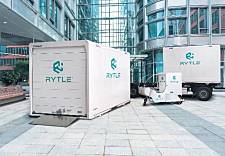Pilot project to develop a delivery concept for the future

The main focus of the research project headed by Bremerhaven University of Applied Sciences – together with the partners Rytle GmbH and Weser Eilboten GmbH – is the development and piloted application of a novel and sustainable last-mile logistics system based on a crowd logistics approach in which student drivers are allocated on demand to transport assignments at peak periods.
The intention is that IT-driven pooling effects on deliveries at product and client level should make the overall system more efficient. Also, the project will develop Sustainability Customer Relationship Management (SusCRM) techniques in order to enhance sustainability as a key marketing factor and to develop incentives to take part in a sustainable logistics system at various stakeholder levels.
The aim is to develop a sustainable logistics system at the ecological (emissions and traffic reduction), social (fair employment contracts) and economic (long-term competitiveness) levels. The combination of the various project partners and their specific expertise offers the best preconditions for a
The main features of the logistics system are, firstly, the very positive effects in the ecological dimension and in the regional transport system, since it is based on electric delivery tricycles and is thus (at least locally) zero-emission and takes up little space in the transport system. Secondly, it offers interesting economic potential for the logistics service provider. In comparison to the systems used by conventional parcel delivery service providers, which are based on gasoline or diesel vehicles, it is more flexible in terms of staffing in particular due to the fact that no driving licence is needed. This high flexibility is increased significantly by the crowd approach, thus boosting the competitiveness of this environmentally compatible logistics system.
Another special feature of this project is that a “combined delivery” pools the journeys both for the delivered products and the courier company which has to deliver the products. The upshot of this is a much more efficient and thus more environmentally friendly logistics system. However, this places new demands on the system, both at organisational and at technical level.
Also, the project will develop Sustainability Customer Relationship Management (SusCRM) techniques in order to enhance sustainability as a key marketing factor and to develop incentives to take part in a sustainable logistics system at the levels of logistics client (b2b) and final consumer (b2c) and at staff level.
The project is based on the newly developed last-mile logistics system of Rytle, a Bremen-based company, consisting of a highly efficient system of mobile hubs, electric delivery tricycles and a digital infrastructure. The system is to be piloted in a defined test area in Bremerhaven.

This project focus on innovation an is supported by our heroine Felicia